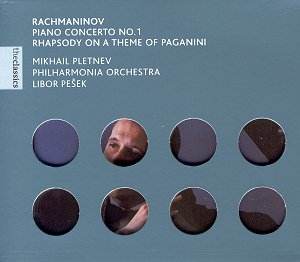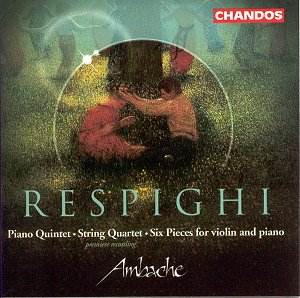 Composer: Sergei Rachmaninov
Composer: Sergei Rachmaninov
Works: Piano Concerto No. 1, Rhapsody on a Theme of Paganini
Performers: Mikhail Pletnev (piano), Philharmonia Orchestra/Libor Pesek
Recording: December 1987, St Augustine’s Church, Kilburn
Label: Virgin Classics 7243 5 61976 2
Rachmaninov’s early works, particularly his Piano Concerto No. 1, often evoke the fervent romanticism of late 19th-century Russia, imbued with a youthful exuberance that belies its Opus 1 designation. Premiered in 1892, this concerto reflects a composer still in the throes of artistic maturation, yet already demonstrating a profound understanding of orchestral color and piano lyricism. The Rhapsody on a Theme of Paganini, completed in 1934, showcases Rachmaninov’s later style, characterized by a more concise structure and a heightened sense of thematic development. This reissue of Pletnev’s interpretation, alongside the Philharmonia Orchestra under Libor Pesek, offers listeners a compelling juxtaposition of the composer’s early and late creative impulses.
From the outset, Pletnev’s interpretation of the Piano Concerto No. 1 establishes a distinctive character that is both grand and intimate. The performance opens with a bold, virtuosic flourish that captures the listener’s attention, but what follows is equally notable for its sensitivity. Pletnev’s approach to rubato is particularly effective, allowing for a fluidity in the musical line that honors the work’s Russian romanticism. For instance, in the second movement, the lyrical passages are imbued with a deep emotional resonance, showcasing Pletnev’s ability to balance technical prowess with interpretive depth. While Ashkenazy’s celebrated recording offers a more visceral rhythmic attack, Pletnev’s execution reveals a nuanced understanding of the ebb and flow characteristic of Rachmaninov’s music.
The recording quality is superb, allowing the rich textures of the Philharmonia Orchestra to shine through with crystalline clarity. The engineering captures the interplay between piano and orchestra, highlighting the intricate dialogues that define Rachmaninov’s orchestration. The climactic moments are rendered with a sumptuous richness, while subtler details, such as the woodwinds’ delicate interjections, are never lost in the mix. This attention to detail enhances the overall listening experience, making the recording a valuable addition to Rachmaninov’s discography.
In the Rhapsody on a Theme of Paganini, the collaboration between Pletnev and Pesek reaches a heightened level of cohesiveness. The variations flow seamlessly into one another, demonstrating a compelling momentum that underscores Rachmaninov’s ability to transform a simple theme into a complex tapestry of sound. The final variation, with its playful and virtuosic character, showcases Pletnev’s technical command while also revealing a sense of warmth that transcends mere display. The interpretive choices made here—particularly the deliberate slowing before the final gesture—add an emotional weight that resonates beyond the notes.
This recording may not claim the mantle of definitive performances that some listeners might seek, yet it offers a plethora of insights into Rachmaninov’s artistry. Pletnev’s interpretative choices, combined with the superb orchestral support and high-quality engineering, create a richly rewarding listening experience. The juxtaposition of youthful exuberance and reflective maturity encapsulates Rachmaninov’s journey as a composer, making this release an essential exploration of his evolving musical landscape.



